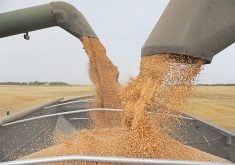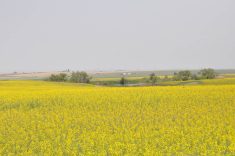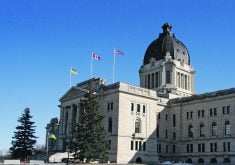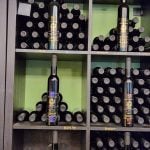REGINA — Ray Orb sat on the stage in front of rural municipal delegates last week wearing an unfamiliar jacket.
For 20 years he was recognizable in one of the beige suitcoats worn by Saskatchewan Association of Rural Municipalities directors. Now he’s wearing navy, after stepping down as president in August. He spent nine years in that job and 37 years in rural politics. Orb had said at the March annual convention that he wouldn’t run again in 2025.
During a farewell chat at the midterm convention in Saskatoon, Orb reassured delegates that he was healthy but it was time to do other things, especially with his family.
Read Also

Heat waves combine sunshine and sinking air
As we continue our look at heat waves, I figured we should first define what they are by looking at the criteria Environment Canada uses to define heat events.
He listed changes to education tax on farmland as one of the main SARM accomplishments.
“It was always an issue prior to 2007,” he recalled. “It was slow, but we convinced the provincial government to change that and to this day there is tax relief in the millions of dollars every year to farmers.”
In fact, numerous resolutions about the unpopular tax used to dominate conventions. In 2004, the year Orb joined the board, delegates rallied at the Legislature to protest.
But even before that, he was active in making sure farm voices were heard. He was one of the people who staged a sit-in at the Legislature in February 2000 to protest the need for more farm aid.
“I slept in the Legislative Assembly in Regina overnight on the marble floor,” he said. “It was something that farmers needed to work together on and we did work together on.”
Orb said SARM has made progress on other perennial issues of rural crime and infrastructure but there is still work to be done.
He also said his time on the Federation of Canadian Municipalities board helped build bridges between urban and rural areas. The board worked hard to get recognition for rural Canada’s place in the economy, he said.
Some believed cities were the engines of the economy.
“We convinced them that if that’s true, then rural municipalities are the fuel to run those engines,” he said.
SARM is also well known and respected in Ottawa, Orb added.
“I guarantee you there isn’t a member of parliament or a senator who doesn’t know who SARM is.”
Orb said he was thankful for the opportunity and doesn’t need any more recognition.
“I’ve got my reward in just seeing how much RMs have progressed in this province. I don’t need any more thanks.”
SARM executive director Jay Meyer is also leaving the organization after 10 years. Laurel Feltin is replacing him.
“It has been an experience of a lifetime,” said Meyer.
He is now assisting Saskatchewan Polytechnic with a course for municipal administrators.
















